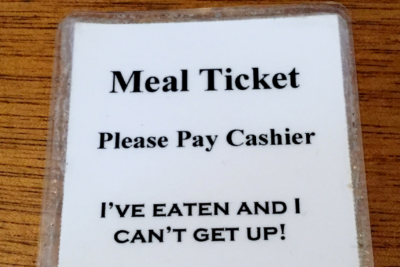A Bird In The Hand ...
… is worth two in the bush.
This proverb encapsulates two truths:
- We value things we can have now more than things we will receive in the future, and
- If there is uncertainty about what we may receive in the future, we also value it less.
I know that donut is bad for me, but it sure tastes good, and I took the stairs this morning (didn’t I?), and I worked really hard today, and I really want it.
Here’s the problem with many of our daily habits: the connection between that donut today and our weight tomorrow, let alone a few months from now, is virtually invisible. Same thing with a single workout and our long-term fitness. Put differently, the future value of a single decision today is highly uncertain. I think this explains why we as individuals so often fail the so-called Marshmallow Test (that we do not defer immediate gratification for a later gain). See Failing The Marshmallow Test.

At the same time, the cumulative effect of daily decisions we make over months and years is all too plain. If we spend more than we earn, we will rack up debt. If we do not exercise, we’ll be unfit. We all know this, and yet we routinely manage to avoid thinking about it.
Are there ways to overcome our default nature of ignoring the cumulative long-term effects of individual daily decisions? Keeping in mind the root causes, i.e. we value most highly current consumption, and the future is uncertain, we have two potential levers. We can:
- Increase the perceived value of the future reward, and
- Decrease uncertainty about the likelihood we will receive the reward.
We can make a future reward more valuable by making it more personal and tangible. Let’s face it, we don’t feel as if we have much in common with our future self. Maybe this is because most of us have a hard time imagining that we will be old. Can we overcome this failure of imagination? Try aging a photo of your current face; there are many apps. When you actually see a picture of your future aged self, you can much more easily imagine you will one day be older. This simple trick allows you to wonder about your future life, and in turn to care about your future self.
So visualize yourself 30 years from now, think about what your life will be like, and remember that that will be you.
To decrease uncertainty about the future impact of your actions, try changing the frame. It’s hard to discipline yourself to avoid things that are bad for you like overeating or being sedentary. So instead of playing defense, turn your daily habits into an affirmative offensive weapon. You’re not going to get a flat stomach or run a marathon overnight. But can you walk for 30 minutes a day, and switch from a processed snack to a piece of fruit? Yes you can.
Don’t think of this as using up willpower to keep from doing things that are bad for you. Rather, you are taking small positive steps by doing things that you like. And don’t worry if you don’t like the positive steps at first. After a couple of weeks, you will like what you do. You may find that fostering good habits is easier than avoiding bad ones. Even if the actions you take as a result are identical.
In your mind then, consider your daily habits to be your secret weapon to drive long-term outcomes one small step at a time.
Be well.






Member discussion